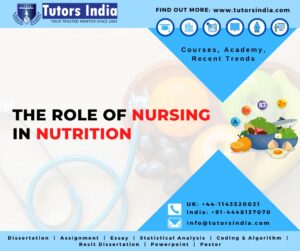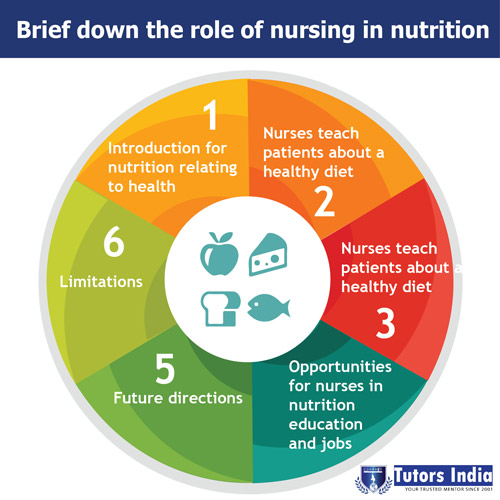The role of nursing in nutrition
In Brief
Food plays an essential part in disease prevention, regeneration, and long-term wellness. A balanced diet can also make you look and feel better. The importance of nursing in nutrition cannot be emphasised enough, for nurses play a crucial role in educating patients about nutrition and adopting healthy eating practices. Nurses must understand the value of diet basics to clarify the truth about safe food options to their patients since they are the primary point of communication for them. Nutrition courses give students the confidence they need to separate reality from imagined when it comes to safe eating and transfers their knowledge to their patients. Nurses must not only be able to describe the ins and outs of a balanced diet, but they must also provide a precedent for their patients.

Nurse’s role in nutrition
Preventing illness, particularly chronic illnesses like diabetes and heart disease involves making healthier food decisions. The role of nurse in nutrition is not just limited to hospitals. Although hospital nurses may be more concerned with patients’ nutritional needs suffering from infections, neighbourhood nurses are more concerned with prevention. The role of nurse in nutrition education often involves nurses serving in schools or health centres, who frequently offer nutrition education to the general population to avoid chronic diseases.

A nurse can have information about healthy eating, such as how a high-sugar diet can lead to type 2 diabetes. People with diabetes need special nutrition. “Overheavy is one of the main risk factors for type 2 diabetes, and a diet rich in calories from either cause leads to weight gain,” articulates diabetes.
For instance, sugar consumption is more likely to lead to obesity (and type 2 diabetes) than whole grains or fish consumption. Nurses need to consider adequate nutrition concerning healing.
Health is vital not just for disease prevention but also for regeneration. “The healing of the body will take place only when the nutrients that provide the building blocks for reconstruction are available,” says one source. The burden of educating patients about healthy eating patterns frequently falls to attending nurses due to a shortage of qualified nutritionists, thereby emphasising the role of nurse in nutritional education. They will create meal schedules that patients can take home and follow even after they leave the hospital. Nutrition is needed for the healing process to take place: “Fats and carbohydrates play a role in wound healing as well. They prevent the body from using protein as a supply of energy, causing it to be used to repair tissue instead.”
Nurses Teach Patients about a Healthy Diet
Nurses will educate their patients about a good diet and how it affects their well-being in various ways. The importance of community health centre presentations cannot be overstated. A nurse with the necessary skills will create a PowerPoint demonstration for a group of senior citizens to see at a health fair. They will also provide literature for participants to take home for more research and advice. Similarly, at a school meeting, a school nurse will give the children information on good eating and give them brochures to take home.
Nurses who serve in hospitals and clinics are likely more concerned with diet when recovering from sickness, surgery, or other therapies. Many patients may be on strict tariffs during their stay, so nurses will speak to them at their bedside and describe the special foods they provide at the hospital to help them heal. This nurse may also obtain valuable and reliable literature to pointer out to patients as they are discharged. Healthy eating extends well beyond the hospital, especially if the patient intends to remain out of it.
Opportunities for Nurses in Nutrition Education and Jobs
One of the reasons nurses should be expected to fill those holes is that there aren’t enough dieticians or certified nutritionists to fulfil their needs. Unfortunately, nutrition courses are not always required in nursing school, but certain classes may discuss it as part of a broader seminar. On the other hand, Basic Human Nutrition is a corequisite course. This nutrition class includes “core principles of nutrition, as well as a variety of influences that influence dietary practices.”
Future directions
Thus far, three pilot sites have been chosen with nutritional care resource nurses from each clinical setting being described. They will perform a standard audit when this phase is finished, and they will be encouraged by regular forums to enforce the strategy. The health service’s education unit has developed an online education platform. Audits and a customer satisfaction meal survey will be used to assess the policy’s effectiveness therefore, the role of nurse in nutrition programmes can be considered a potential future research direction.
Interesting Sample: Contemporary Theories of Nursing Practice- Domestic Abuse (Comparison of Health Services in UK and India)
Limitations
This meta-synthesis of the literature has several drawbacks. First, even though the demographic and treatments were described in the clinical issue, there was no reference group. It was due in part to the shortage of randomised control trials on this significant subject. It’s also doubtful that research withholding nursing care for patients’ diets would be completed, while studies evaluating existing practise using quasi-experimental designs may be done.
Conclusion
The eight principles should be applied in any health-care environment, and the proposal has a broad scope. While other approaches, such as dietary additives and improvements to the foodservice, are also vital parts of nutrition treatment.
the eight guidelines provide a chance to identify the nurse’s position in this vital field of work And other contexts, such as education. The policy offers helpful guidance and research resources for educating registered nurses, enrolled nurses, and nursing assistants about hospital malnutrition and interventions implemented in the clinical environment to minimise its prevalence.
Managers should use the policy as a starting point for thinking about ways to fix patient malnutrition in their health systems. Researchers emphasise that managers should apply every guideline or standard from this proposal to their local circumstances. They say that the best way to do so is to implement a comprehensive and multidisciplinary consultation process.
Tutors India offers Human Nutrition Nursing Assignment writing services as well as Nursing thesis online with help of the Expertise. These Subject-Matter Expertise are fully capable of writing on any subject with regards to nursing and travel nursing in particular.
References:
- Bell D & Valentine G (2020) Consuming Geographies, We Are What We Eat. Routledge, London.
- Brogden BJ (2019) Clinical skills: the importance of nutrition for acutely ill hospital patients. British Journal of Nursing (BJN) 13, 914.
- Clay M (2020) Nutritious, enjoyable food in nursing homes. Elderly Care 12, 11–16.
- Copeman J (2020) Clinical. Promoting nutrition in older people in nursing and residential homes. British Journal of Community Nursing 5, 277–278.

 Previous Post
Previous Post Next Post
Next Post